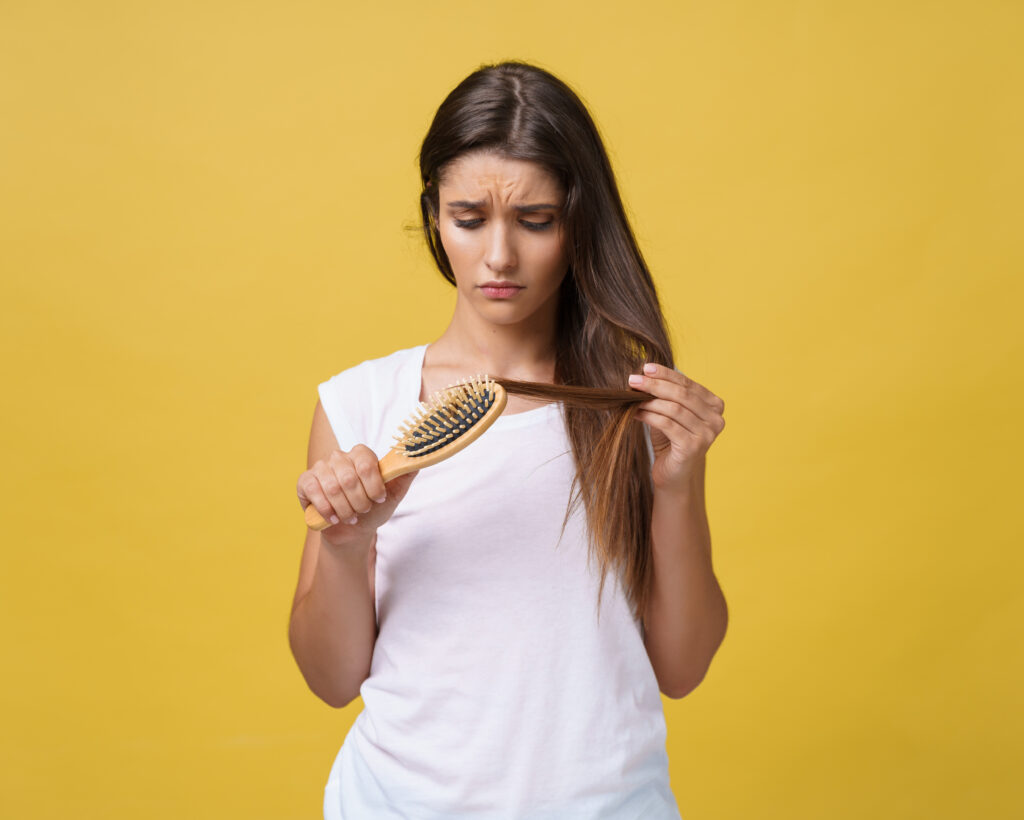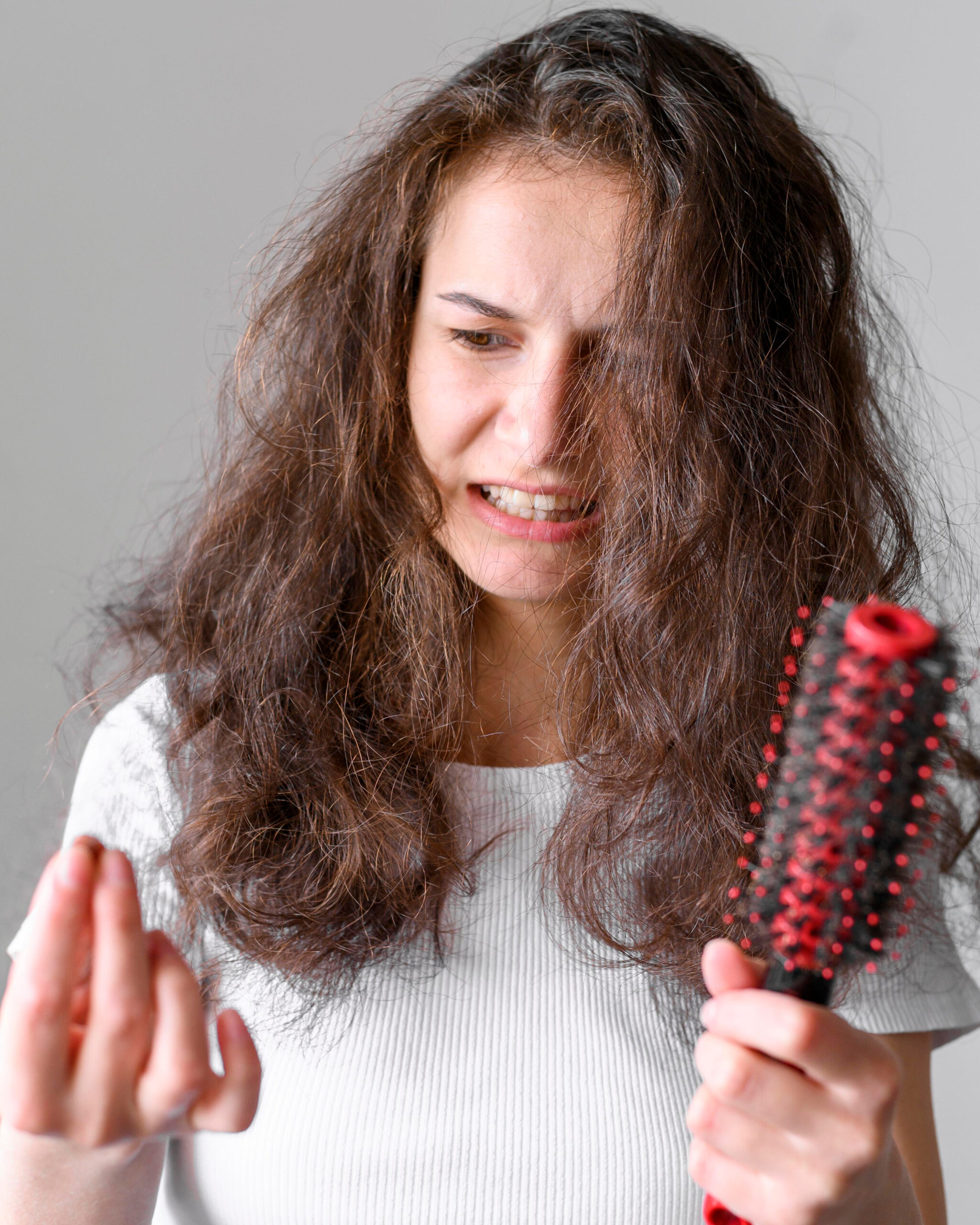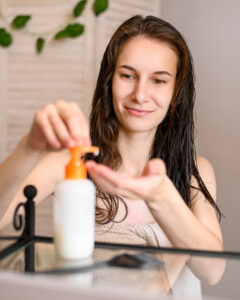Hair fall can feel like a never-ending battle—strands on your pillow, your hairbrush, and even your clothes. But here’s the good news: you don’t need expensive treatments or salon visits to fight hair loss. With the right tips for controlling hair fall, you can start improving your hair health from the comfort of your home.
In this guide, we’ll explore natural, effective methods that are easy to follow, budget-friendly, and perfect for beauty-focused women looking to take charge of their hair.

What Causes Hair Fall?
Before we tackle solutions, let’s understand why hair fall happens in the first place. Common causes include:
- Hormonal imbalances
- Nutritional deficiencies
- Stress and lack of sleep
- Over-styling and heat damage
- Scalp infections or dandruff
- Harsh chemical treatments
Now, let’s jump into natural ways to regain control of your strands!
Tips for Controlling Hair Fall Naturally at Home
1. Oil Your Hair Regularly with Hair Fall Control Oils
One of the most tried-and-true remedies is oil massage therapy. Massaging your scalp stimulates blood flow and nourishes hair follicles. Plus, the right hair fall control oil can boost growth and reduce shedding.
Best Natural Oils for Hair Fall:
- Coconut Oil – Strengthens and deeply conditions.
- Castor Oil – Rich in ricinoleic acid for growth stimulation.
- Onion Oil – Helps reduce breakage and improves volume.
- Bhringraj Oil – Known in Ayurveda for promoting hair regeneration.
Pro Tip: Warm the oil slightly and massage it into your scalp in circular motions. Leave it on for at least 1 hour or overnight before washing it off with a mild shampoo.
2. Use a Gentle, Sulfate-Free Shampoo
Harsh shampoos strip natural oils and irritate the scalp, which may trigger more hair fall. Opt for sulfate-free and paraben-free shampoos that nourish your hair while gently cleansing.
Ingredients to Look For:
- Aloe vera
- Biotin
- Tea tree oil
- Keratin
- Argan oil
Avoid washing your hair every day—2-3 times a week is ideal for most hair types.
3. Apply DIY Hair Masks Weekly
Homemade hair masks are a great natural hair fall treatment. They help repair damaged hair, strengthen roots, and add shine.
Top DIY Hair Masks:
Egg & Yogurt Mask:
- 1 egg
- 2 tbsp yogurt
- 1 tbsp olive oil
Mix and apply from roots to ends. Leave for 30 minutes, then rinse.
Fenugreek (Methi) Paste:
- Soak 2 tbsp fenugreek seeds overnight
- Grind into a paste and apply
- Leave for 30–40 minutes and rinse off
Fenugreek is packed with protein and nicotinic acid that promote healthy hair growth.
4. Eat a Hair-Healthy Diet
Hair reflects your internal health. If you’re not getting the right nutrients, hair fall is bound to happen.
Key Nutrients for Hair Growth:
- Protein – Builds keratin, the key hair protein
- Iron & Zinc – Improve blood circulation and follicle strength
- Omega-3 Fatty Acids – Nourish hair from the inside out
- Biotin & Vitamins A, D, and E
Food Sources: Spinach, almonds, eggs, salmon, flaxseeds, lentils, avocados
Hydration Tip: Drink at least 8 glasses of water daily to keep hair and scalp hydrated.
5. Reduce Heat Styling and Tight Hairstyles
Flat irons, curling wands, and blow dryers may give your hair that perfect look—but at a cost. Regular heat styling weakens the hair shaft, leading to breakage.
Simple Switches:
- Air-dry your hair whenever possible
- Use a heat protectant spray before styling
- Avoid tying your hair too tight—loose buns and braids are better
6. Practice Scalp Care
A healthy scalp equals healthy hair. Dandruff, product buildup, or poor hygiene can clog follicles and cause shedding.
Scalp Tips:
- Exfoliate weekly with a scalp scrub
- Use tea tree oil to combat dandruff
- Rinse with diluted apple cider vinegar once a week to balance pH
7. Manage Stress and Sleep Well
Stress is a silent hair killer. It triggers a condition called telogen effluvium, which pushes hair into the falling phase prematurely.
Natural Stress Busters:
- Yoga or meditation for 15 minutes daily
- Deep breathing exercises
- Maintaining a consistent sleep schedule (7–8 hours a night)
8. Try Natural Supplements (After Consultation)
While food should be your main source of nutrients, supplements can help if you have deficiencies.
Popular Hair Supplements:
- Biotin (Vitamin B7)
- Collagen
- Iron or Zinc (if you’re low)
- Vitamin D (especially for indoor lifestyles)
Important: Always consult a doctor before starting new supplements.
Quick Daily Routine for Hair Fall Control
Here’s a simple at-home hair care plan you can follow:
| Day | Activity |
| Mon | Light oil massage + gentle shampoo |
| Wed | Use a nourishing DIY hair mask |
| Fri | Scalp rinse with apple cider vinegar |
| Sun | Deep oil massage with hair fall control oil |
Also Read : 5 Best Tips on How to use conditioner for hair growth
Conclusion: Take Small Steps for Big Hair Wins
Controlling hair fall naturally isn’t about drastic changes—it’s about consistent, healthy habits that protect and nourish your strands from root to tip. From using the right hair fall control oil to improving your diet and reducing stress, each small step makes a big difference.





Pingback: 15 points to remember buying the best hair oil in India